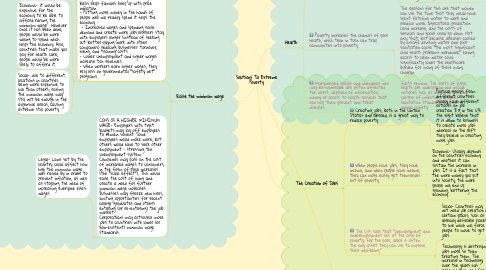
1. Raise the minimum wage
1.1. PROS OF A HIGHER MINIMUM WAGE- - Raising the minimum wage on a regular basis helps families keep up with price inflation. - Putting more money in the hands of people who will readily spend it helps the economy. - Increased wages and spending raise demand and create more jobs.Workers stay with employers longer (instead of seeking out better-paying work with other companies) reducing businesses’ turnover, hiring, and training costs. - Lower unemployment and higher wages increase tax revenues. - When workers earn higher wages, they rely less on governmental “safety net” programs.
1.1.1. Political- Due to each country having drastically different opinions amongst political parties, there is no unified opinion on raising the minimum wage. By doing so however would reduce the need for the government to give out benefits in countries that offer it.
1.1.2. Economic- it would be expensive for the economy to be able to afford raising the minimum wage . However once it has been done, people would be more willing to spend which helps the economy. Also, countries that make you pay for health care, people would be more likely to afford it.
1.1.3. Social- due to different locations in countries being more expensive to live than others, raising the minimum wage may still not be enough in the expensive areas, causing extreme still poverty .
1.2. CONS OF A HIGHER MINIMUM WAGE- Employers with tight budgets may lay off employees to remain solvent. Some employees would make more, but others would have to seek other employment – stressing the unemployment system. Companies may pass on the cost of increased wages to consumers, in the form of price increases (the “scale effect”). This would raise the cost of living and create a need for further minimum wage increases. Businesses may freeze new hires, limiting opportunities for recent college graduates and others entering (or re-entering) the job market. Corporations may outsource more jobs to countries with lower (or non-existent) minimum wage standards.
1.2.1. Legal- Laws set by the country could affect how high the minimum wage was raised by in order to prevent inflation, as well as stopping the need of increasing everyone else's wages.
2. Educating Women- Politics have a big part in the lack of development of the education of women in certain countries. It's often down to governments not seeing the point in educating women due to religious or personal beliefs which effects job opportunities as well as self- esteem for women. Economical- For countries without free education it could be expensive for families to send more of their children to school. Social- Certain areas of the world it is not seen as necessary to send girls to school due to their cultural backgrounds. Legal- there are many laws around the world that limit women's opportunities and rights to education.
3. Health
3.1. causes of poor health for those around the world can be rooted in political, social and economic injustices.
3.1.1. The World Bank says that access to clean water and sanitation is “one of the most cost-effective development interventions, and is critical for reducing poverty.”
3.2. Poverty increases the chances of poor health, which then in turn can trap communities into poverty.
3.2.1. The reasons for this are that women can use the time that they would have spent fetching water to work and produce more, agricultural production could increase, and the costs of services and goods could go down. Not only that, but because diseases caused by unsafe drinking water and poor sanitation cause “the most significant child health problems worldwide,” having access to clean water could significantly lower the healthcare burden for many of these many children.
3.3. Marginalised groups and individuals who may be vulnerable are often affected the worst, deprived of information, money or access to health services that can help them prevent and treat diseases.
3.3.1. facts remain: The roots of public health are widespread and include victories such as immunisation and control of infectious disease, sanitation standards and motor vehicle safety.
4. The Creation of Jobs
4.1. Creating jobs, both in the United States and abroad, is a great way to reduce poverty.
4.1.1. Political groups from different countries usually have different outlooks on job creation. E.g in the U.K the right believe that it is down to business to create more jobs whereas on the left they believe in creating more jobs.
4.2. When people have jobs, they have income, and when people have income, they can more easily get themselves out of poverty.
4.2.1. Economic- Usually depends on the countries economy and whether it can sustain the increase in jobs. It is a fact that the more money you put into society, the more people will end up spending, bettering the economy.
4.3. The U.N. says that “unemployment and underemployment lies at the core of poverty. For the poor, labor is often the only asset they can use to improve their well-being.”
4.3.1. Social- Countries may not need job creation in certain places, such as already desirable places to live which will force people to move to get jobs.
4.3.2. Technology is destroying jobs more so than creating them. The increase in technology over the years has lessened the need for manpower.
